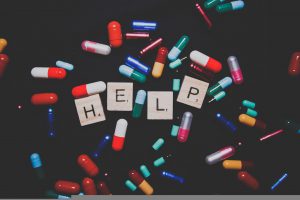The human brain is such a complicated thing. And human feelings? Forget it. For most people who don’t have advanced degrees in studying the brain, it can sometimes feel like a complete mystery why we like what we like, want what we want, feel what we feel – especially when something like depression hits.
So that might be why it’s felt almost comforting to look at depression as a “chemical imbalance” in the brain, something that could be reduced to a simple equation – you have this much serotonin, but you should have this much. But, for better or worse, the chemical imbalance theory of depression, which has long been questioned by a lot of experts, has well and truly been debunked. Let’s take a look at a new study that is the nail in the coffin for this theory that so many of us still believe.
The History of the “Chemical Imbalance” Theory
Again, depression is complicated. Experts have been struggling for a very, very long time to explain it, and thus find an effective way to treat it, and make the lives of those living with it better. While there are sometimes obvious reasons for someone to become depressed – trauma, childbirth, loss, extended periods of chronic stress – there are many other people who feel the crushing weight of depression with no known cause associated with a life event or situation.
So experts, especially in the 1970s and 80s, began looking at biological causes of depression. Could it all just be deviations in brain structure, neurochemistry, and genetics? And so what eventually evolved was what has become popularly known as the “chemical imbalance” theory of what causes this condition. Many thought that too much or too little of essential signal-transmitting chemicals – neurotransmitters (such as serotonin) – were present in the brain of people who were suffering from depression, so treatments like selective serotonin reuptake inhibitors (SSRI) antidepressant medications began to be prescribed.
But it turns out that the whole serotonin-based theory of depression is pretty much dead among experts, and a “new” study has put the final nail in the coffin of it for some – although, for others, it’s simply been an unsurprising confirmation.
A New, But Unsurprising, Study
A major new review of the research – the first of its kind to exhaustively review the evidence of whether serotonin levels play a major and provable part in depression, was published just this past summer in the journal Molecular Psychiatry. And this study confirms the beliefs of all those who’ve been skeptical of the chemical imbalance theory of depression.
In “The Serotonin Theory of Depression: A Systematic Umbrella Review of the Evidence,” University College London Psychiatry Professor Joanna Moncrieff and a team of five other top European researchers found “there is no evidence of a connection between reduced serotonin levels or activity and depression.” In fact, they found evidence of higher levels of serotonin in people with depression, most likely because of the widespread use of SSRIs. They also found no difference between the genes of people with depression and people without it, and found that stressful life events were much more likely than anything else to play a part in developing depression.
But another interesting finding of their study was how “influential,” according to the researchers, the serotonin theory of depression still is. They noted that “85-90% of the public believes that depression is caused by low serotonin or a chemical imbalance,” despite the fact that, according to their study of the many studies out there that there is “no support for the hypothesis that depression is caused by lowered serotonin activity or concentrations.”
And some experts say this is leading most of us to look at depression and its treatment in the wrong way, and to want to find a simple medical “cure” to a more complicated problem. For example, Daniel Carlat, the editor of The Carlat Psychiatry Report, told National Public Radio, “I’ll often say something like the way Zoloft [an antidepressant drug] works, is, it increases the level of serotonin in your brain (or synapses, neurons) and, presumably, the reason you’re depressed or anxious is that you have some sort of a deficiency. And I say that not because I really believe it, because I know the evidence really isn’t there for us to understand the mechanism—I think I say that because patients want to know something. And they want to know that we as physicians have some basic understanding of what we’re doing when we’re prescribing medications.”
So are antidepressants, then, about to be tossed out like the chemical imbalance theory?
Are Antidepressants Still Relevant?
As we pointed out above, the rejection of the chemical imbalance theory of depression is not uncommon among the scientific community, with most experts saying that the “chemical imbalance” theory was tossed out long ago, it’s just that we, the public, weren’t fully informed about it. And maybe that’s because depression is just so complicated, and still so little-understood, that we need something to help us make sense of it. 
But now the logical conclusion for some people (in both the everyday public and the scientific community) is that maybe antidepressants are not the answer. And yes, SSRIs by no means guarantee relief from the symptoms of depression. In fact, according to some studies, they are ineffective for as many as 50% of patients with depression. And some experts have questioned whether the claims of the makers of these drugs are actually backed up by enough scientific evidence. In other words, as two prominent researchers put it back in the early 2000s, “Are the claims made in SSRI advertising congruent with the scientific evidence?” – to which their answer was a no that they felt was “remarkable and possibly unparalleled.”
But to some experts, the answer to this question of whether antidepressants are still relevant lies in looking at the beginning of the chemical imbalance theory in a different way. Because they do actually work for some people, right? We wouldn’t have started using them otherwise – but it’s interesting to note that the original antidepressants weren’t developed as a treatment for serotonin levels.
Actually, one was originally used to treat TB, and the other was an antihistamine. But in the 1950s, it was observed that they improved mood; further study showed that one of the things they did was block the reuptake of serotonin after it had been secreted (like an SSRI), so voila. A simple hypothesis that has stuck around in our minds for ages was born: if antidepressants were shown to boost levels of serotonin, then low levels of serotonin must be to blame for depression. Pharmaceutical companies then developed SSRIs, and shouted that message from the rooftops – and now SSRIs are under a lot more scrutiny, especially with this big, new study.
But while a lot of experts – the researchers of the above study included – seem to think that SSRIs are not the way to go at all, others think they can play a part in treating some people, until something better comes along. It’s just that we don’t really know how they work, just that for some, they perform better than a placebo. Is that enough? Are they doing harm?
Christopher Davey, head of the department of psychiatry at the University of Melbourne, is on the fence about antidepressant use, but certainly not anti-SSRIs (as the authors of the new study seem to be), but is totally on board with the final debunking of the chemical imbalance theory. And not just among the scientific community, but among all of us, so we can all be more equipped to find the right combination of things that can help relieve the symptoms of this incredibly complex condition.
Davey says, “when contemplating whether an antidepressant might be an option for someone with depression, it is of little consequence that its mechanism of action is incompletely understood. So let’s put the chemical imbalance theory to bed. We should continue our efforts to understand the nature of depression while we keep searching for better treatments.”
It’s becoming increasingly clear that the deceptively neat explanation of depression that explains it as a chemical imbalance, or mainly due to low serotonin levels, or any other completely biological-based theory, just isn’t backed up by evidence. Our brains are complex, and so are the reasons for depression – and so finding the right treatment is also going to be complex, unfortunately. But if you’re living with depression, keep working with a professional who can help you find what works for you, whether that includes medication or not.
Co-written by Joanna Bowling
